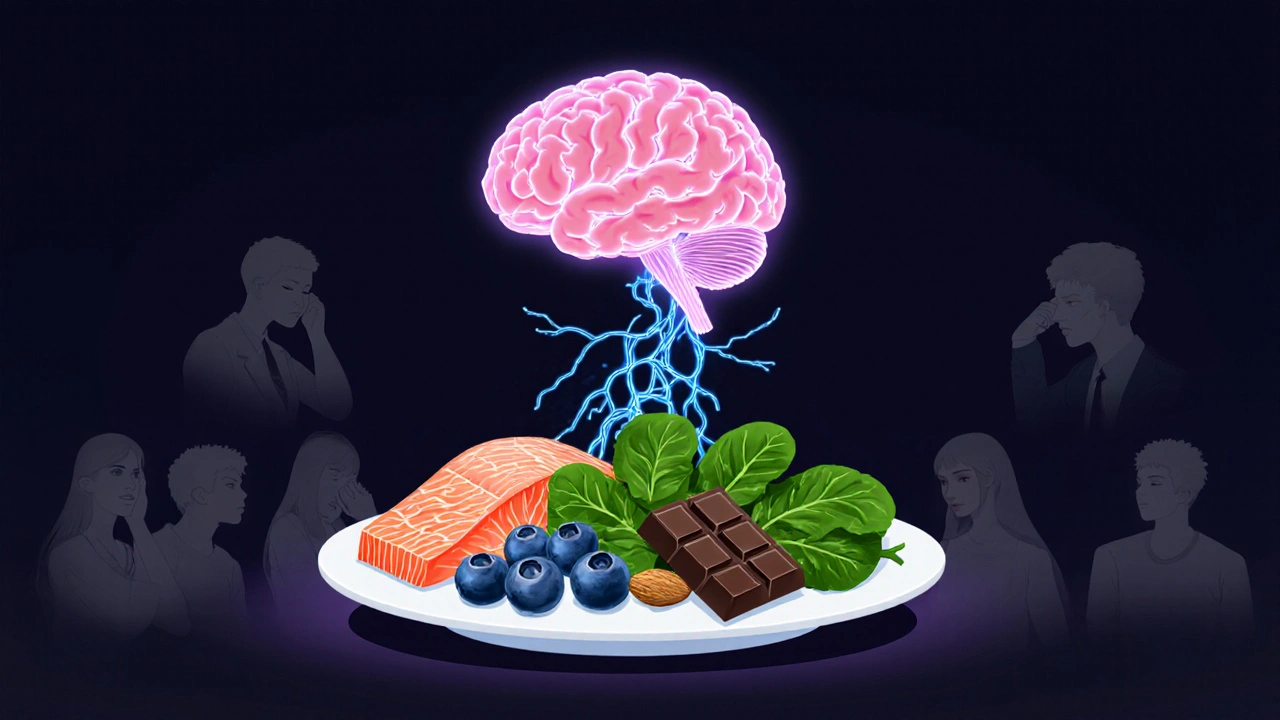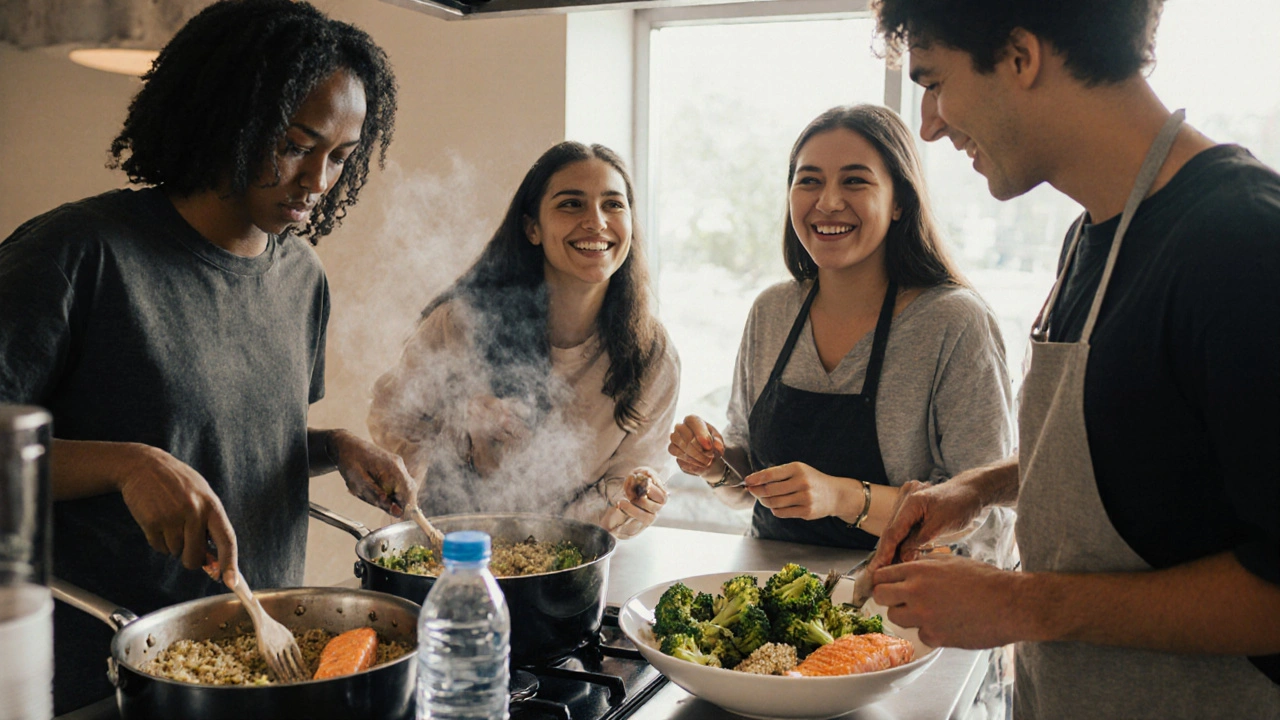
When you’re pulling an all-nighter before finals, eating ramen for the third night in a row, and skipping breakfast because you’re running late-your brain isn’t just hungry. It’s running on fumes. And that’s not just about energy. It’s about focus, patience, and whether you feel like getting out of bed at all. The truth is simple: what you eat directly affects how you feel. For students juggling classes, part-time jobs, and social pressures, food isn’t just fuel. It’s a tool for mental resilience.
How Food Changes Your Mood
Your gut and your brain are connected by a highway called the vagus nerve. Every bite you take sends signals straight to your emotional center. Studies show that people who eat more whole foods-vegetables, fruits, whole grains, lean proteins-report lower levels of anxiety and depression. Those who eat mostly processed foods, sugar, and fried snacks are up to 40% more likely to feel down or overwhelmed. This isn’t coincidence. It’s biology.
Take serotonin, the chemical that helps you feel calm and steady. About 90% of it is made in your gut. And it doesn’t just appear out of nowhere. It needs tryptophan, a building block found in turkey, eggs, tofu, nuts, and seeds. Without enough of it, your brain struggles to make serotonin. That’s why skipping meals or living on energy drinks leaves you irritable and drained.
Top 5 Foods That Help Students Stay Calm and Focused
- Oats - A slow-burning carb that keeps blood sugar steady. No crashes. No mid-afternoon brain fog. A bowl of plain oats with a banana and a sprinkle of chia seeds gives you hours of steady energy.
- Fatty fish - Salmon, sardines, and mackerel are packed with omega-3s. These fats reduce inflammation in the brain, which is linked to depression. Just two servings a week can make a measurable difference in mood.
- Dark leafy greens - Spinach, kale, and Swiss chard are rich in folate, a B vitamin that helps your brain produce dopamine and serotonin. Low folate levels are tied to fatigue and low motivation.
- Blueberries - Packed with antioxidants, they protect brain cells from stress damage. A small bowl a day has been shown to improve memory and reduce mental fatigue in college students.
- Dark chocolate (70%+ cocoa) - Not a joke. A small square after dinner can boost serotonin and reduce cortisol, the stress hormone. Just don’t go for the milk chocolate bars with sugar as the first ingredient.
What to Avoid: The Mood Killers
Some foods don’t just do nothing-they actively make things worse.
- Sugary snacks and drinks - A soda or candy bar gives you a quick spike, then a crash. That crash triggers anxiety, irritability, and cravings. It’s a cycle that keeps you stuck.
- Ultra-processed foods - Things like frozen pizzas, instant noodles, and packaged snacks are full of preservatives, artificial colors, and hidden sugars. Research links these to higher rates of depression in young adults.
- Excess caffeine - One coffee in the morning? Fine. Five energy drinks by 4 p.m.? That’s a recipe for jitters, panic attacks, and sleep loss. Poor sleep makes everything feel harder.
- Alcohol - It might seem like a way to unwind, but it’s a depressant. It disrupts sleep, lowers serotonin, and makes anxiety worse the next day.

Simple Meal Ideas for Busy Students
You don’t need to cook gourmet meals. You need quick, real food.
- Breakfast: Greek yogurt with berries and almonds. No sugar added.
- Lunch: Whole grain wrap with hummus, spinach, shredded carrots, and grilled chicken or chickpeas.
- Dinner: Baked salmon, quinoa, and steamed broccoli. Cook in bulk on Sunday.
- Snacks: Hard-boiled eggs, apple with peanut butter, trail mix (no candy), or a small piece of dark chocolate.
Meal prep doesn’t have to be time-consuming. Boil a dozen eggs on Sunday. Wash and chop veggies while you watch TV. Keep nuts and fruit in your bag. These small habits add up.
Hydration and Mental Clarity
Most students don’t realize how much dehydration affects their mood. Even a 2% drop in body water can lead to headaches, poor concentration, and increased stress. If your urine is dark yellow, you’re not drinking enough.
Swap one soda or energy drink a day for water, herbal tea, or sparkling water with lemon. Carry a reusable bottle. Set a reminder on your phone: “Drink water before class.” It’s that simple. And it works.
Why This Matters More Than You Think
Student mental health isn’t just about therapy or sleep. It’s about what’s on your plate. Colleges are seeing rising rates of anxiety and depression. But the solutions aren’t always expensive or complicated. Often, they’re as simple as swapping chips for nuts, soda for water, or skipping breakfast for oatmeal.
This isn’t about being perfect. It’s about making one better choice today. Maybe it’s choosing a banana over a candy bar. Or drinking a glass of water before scrolling through your phone in the morning. Small shifts build resilience over time.
When your body gets the right nutrients, your mind doesn’t just function better-it feels safer. You’re less likely to spiral after a bad grade. You can handle stress without reaching for junk. You sleep better. You wake up with a little more hope.

What If You Can’t Afford Healthy Food?
You’re not alone. Many students face food insecurity. But eating well on a budget is possible.
- Buy frozen vegetables-they’re just as nutritious as fresh, and cheaper.
- Beans and lentils are protein powerhouses under $1 per serving.
- Buy oats in bulk. They last months and cost pennies per bowl.
- Check if your campus has a food pantry. Most do. They offer free fresh produce, eggs, and canned fish.
- Use apps like Too Good To Go to buy discounted meals from local cafes at the end of the day.
You don’t need to shop at Whole Foods to eat well. You just need to know what matters.
Real Students, Real Changes
At UNC Asheville, a group of students started a “Mood Meals” club. They met once a week to cook simple, affordable meals together. No fancy equipment. Just a pot, a stove, and a shared grocery list. After six weeks, 78% reported feeling less anxious. Half said they slept better. One student wrote: “I didn’t realize I was eating like I was trying to numb myself. Now I eat to feel better.”
That’s the power of food. It doesn’t fix everything. But it gives you a foundation. A place to stand when everything else feels shaky.
Can food really treat depression or anxiety?
Food alone won’t replace therapy or medication for clinical depression or anxiety. But it can significantly reduce symptoms and make other treatments more effective. Studies show that people who improve their diet alongside counseling see faster and more lasting improvements than those who only do therapy. Think of food as the foundation-not the whole house, but the ground it’s built on.
How long does it take to feel a difference after changing my diet?
Some people notice changes in energy and mood within 3-5 days. Better sleep, less brain fog, fewer mood swings. For deeper improvements in anxiety or depression, most see noticeable shifts after 3-6 weeks of consistent healthy eating. It’s not magic-it’s your body rebuilding its chemistry.
What if I have dietary restrictions or allergies?
You can still eat for mental health. If you’re gluten-free, choose quinoa, rice, or buckwheat instead of oats. If you’re vegan, get omega-3s from flaxseeds, chia, or algae supplements. If you’re lactose intolerant, use fortified plant-based yogurts. The goal isn’t to copy someone else’s plate-it’s to find what works for your body. Focus on whole, unprocessed foods, and avoid the ones that make you feel worse.
Is it okay to eat junk food sometimes?
Absolutely. Perfection isn’t the goal. If you’re stressed and you want a slice of pizza or a cookie, have it. Guilt makes stress worse. The key is balance. If 80% of your meals are nourishing and 20% are comfort foods, your brain will thank you. It’s not about restriction-it’s about making most of your choices support how you want to feel.
Does caffeine always hurt my mood?
Not always. A single cup of black coffee in the morning can improve focus and alertness. But if you’re drinking multiple cups, switching to energy drinks, or having caffeine after 2 p.m., it’s likely hurting your sleep and increasing anxiety. Try cutting back for a week and notice how you feel. Many students find they don’t need the crash-and-burn cycle.
Where to Go From Here
Start small. Pick one thing: swap your afternoon soda for sparkling water. Add a serving of veggies to your dinner. Eat breakfast once a day. That’s it. No overhaul. No guilt. Just one better choice.
Your brain is working hard. It deserves real fuel. Not just the kind that keeps you awake-but the kind that helps you feel like yourself again.